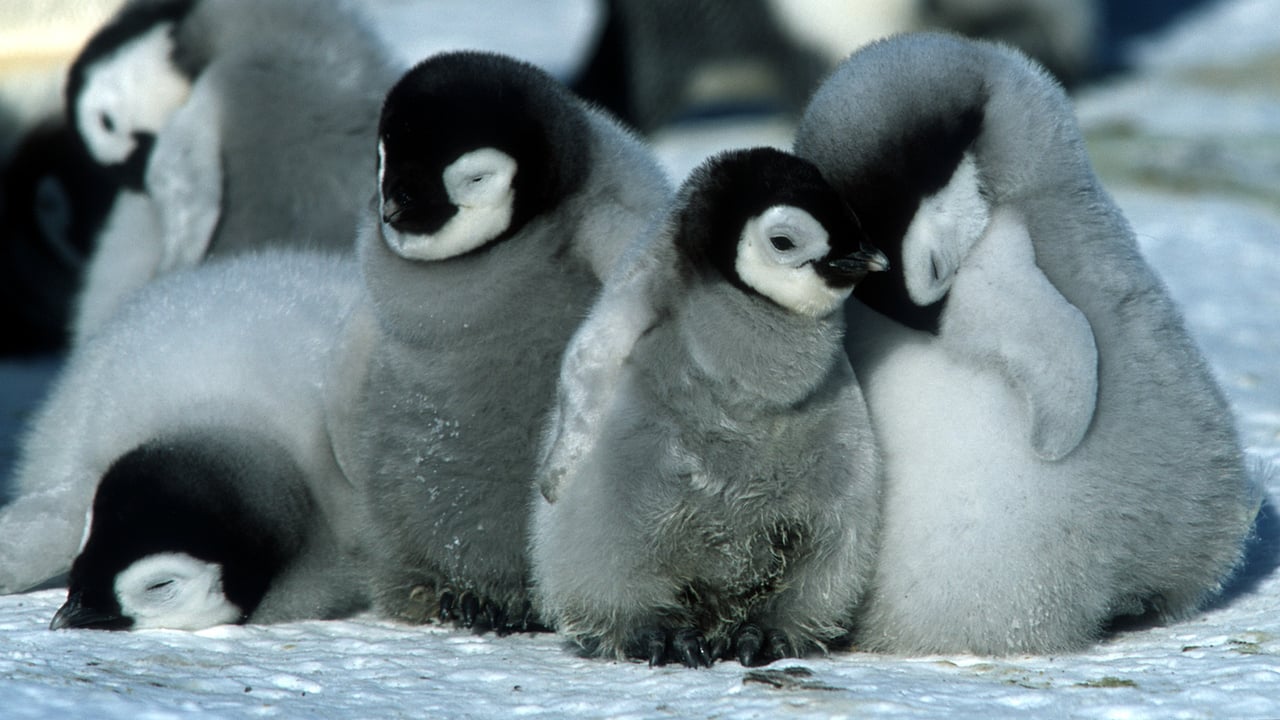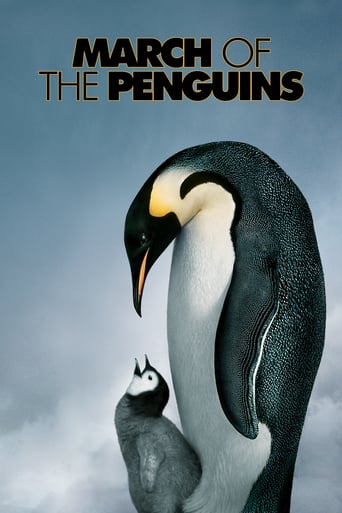Exoticalot
People are voting emotionally.
Libramedi
Intense, gripping, stylish and poignant
Konterr
Brilliant and touching
KnotStronger
This is a must-see and one of the best documentaries - and films - of this year.
Mckenzie Barkdull-Pugmire
This was the single saddest film in the history of film. The combination of the ominous godlike voice over combined with the harsh reality of the animal kingdom cakes this film a tear jerker for everyone. Although this film is a non fiction documentary it makes you feel as though you're watching a well developed story. All around a great movie.
Thaneevuth Jankrajang
This documentary has all the qualities of a good drama. It has actually dramatized the penguins' lives into those of human beings. Compassion is good. Presumption, squeezing human emotions into other species, is not. Penguins are like all creatures, big and small, in their worthiness and rights to exist in the way they want. There is no need to apply human beings' senses to them in order to gain sympathy. I admire this film's beauty and elegance in the presentation. The film's crew is most entitled to the given awards and honors. The unintentional effect, though, is a violation of nature itself. We are supposed to watch, observe, and co-exist with fellow beings in the nature if we are truly respectful of them. An early scene of the whole flock of penguins confronting a severe snow storm during the breeding is narrated as if we knew what they were and really felt. What a presumption. Old-style animal documentaries become classic works because they do not presume to know more than the eyes meet. We are freed up to develop our own understanding and, quite likely, compassion towards what we see and learn. Today's filmmakers become a man who knows too much, clotting the screen with new tools and tactics, depriving the audience their freedom and creativity. Nature ceases being nature, and a media invention is made. This is not a trend that supports the unity of living organisms. Instead, it is a forced humanization of the worst kind. We watch a documentary on Penguins to know Penguins, not knowing better of fellow human beings, which is already in abundance.
Python Hyena
March of the Penguins (2005): Dir: Luc Jacquet / Narrator: Morgan Freeman: Extraordinary documentary about persistence and struggles symbolized within a long winter march taken every year. Penguins gather in massive quantities and trek in nearly single file to the breeding ground. There are many facts to consider such as the females going away for months to gather food while the males protect and shelter the eggs. These males go several months without food before the female returns. There are several species of penguin. Perhaps the most common is the emperor or king penguin, which is said to grow to four feet tall, making it the biggest of the species. Others include the humboldt penguin, chinstrap penguin, and rockhopper penguin. Director Luc Jacquet enlightens viewers upon the harsh conditions in which these unusual birds live but even further he creates a film that demonstrates real character. He takes what is presented on wildlife programs and presents it in narrative form and it works. Morgan Freeman 's deep knowledgeable voice narrates the film thus giving further insight. The result is a film that will appeal to young and old alike with something to offer children to learn as well as the scholars to further study. It is one of the best films of the year, and like The Passion of the Christ the previous year, it shocked the industry by marching away as a hit. Score: 10 / 10
jonesa03
The March of the Penguins is an Academy Award winning documentary that tracks the voyage of the Emperor Penguin as they make their way to and from the ocean to their breeding ground. It is a remarkable tale of the continuation of a species. A theme throughout the film is that of the awe inspiring love of a parent to a child. No matter the species, the gift of life is a marvel and a thing to be cherished. The Emperor Penguins go through great trials in order to bring about the hatching of their young. They must travel many miles in harsh conditions to reach the breeding ground where they can safely lay their single egg. The father penguins must survive months with no food, huddled together to provide warmth to each other and protection to their eggs. Each father is responsible for the egg he harbors on his feet, beneath a fold of warm skin, while the mothers must make the trek back to the ocean in order to feed themselves and bring food back for their babies. The penguins must struggle against the elements, predators, and starvation. They struggle through these things, all in the hopes of a successful hatching.Morgan Freeman is the only human voice heard throughout the duration of the film. He expertly provides the narration needed to understand the movements of the penguins, and assists the viewer in understanding the harshness of Antarctica and the trials that the penguins go through. He provides interesting facts and details about Emperor Penguins that create a bond with the penguins, such as the fact that Emperor Penguins are monogamous, but only for the season. The March of the Penguins is similar to the 2007 documentary Artic Tale. Both movies focus of the lives of animal parents and their young as they struggle to live in the coldest parts of the world. Both show the trials that the animals face to ensure their survival and the possibility of future generations.The voyage of the penguins comes alive with the capabilities of the camera crew. Much of the film is shot from a subjective, eye level height. This really lets the viewer feel like they are in with the penguins and experiencing the harshness of the weather and the joy of the eggs hatching. Often, the camera zooms in on the penguins so the viewer can appreciate the beauty of the penguins and their surroundings. The camera takes a different angle when the long journey to and from the breeding ground is shown. In this case, it's more of an objective view looking down of the penguins as they make their single file march. The view scans out to see the vastness of the icy landscape and the extreme distance they must travel, all in order to create a new generation.Sound is also a key technique in establishing the bond between parent penguins and their young chicks. Before the father penguins leave the young chicks in their mother's care to head back to the ocean to feed after a four month fast, they sing to their babies and their babies sing back to them. This is the only way that they will recognize each other upon the father's return. It is amazing upon the fathers return, that through the chaos of all the penguins singing that each father can find what he is looking for, his chick. In the coldest place on earth, life remains. The Emperor Penguins continue to struggle and survive in order to create the greatest joy in life, a new life. Everything they do is for the benefit of their young chick. A parent's love can withstand harsh weather, fierce predators, and stress to their bodies in order to create a future for their children. The cycle of life continues.

